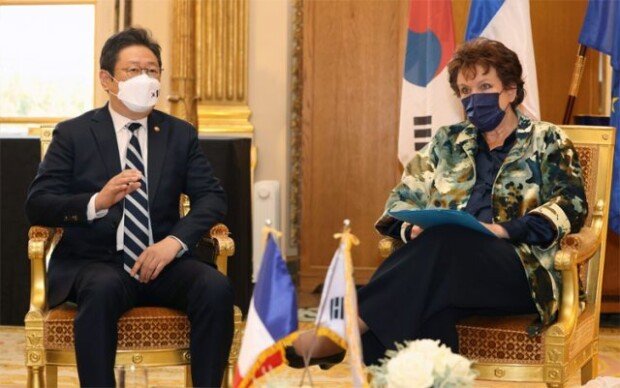France says it will consider lending ‘Jikji’ to S. Korea
France says it will consider lending ‘Jikji’ to S. Korea
Posted November. 19, 2021 07:22,
Updated November. 19, 2021 07:22

The French government said it would actively consider lending “Jikji Simche Yojeol,” currently kept at the National Library of France, to South Korea on condition that there is no concern of confiscation. Given that many European countries have recently begun returning cultural objects that they forcefully acquired in colonial times, public attention is focused on whether exhibitions of Jikji can be held in South Korea.
Minister of Culture, Sports and Tourism Hwang Hee said in a press conference in Paris, France that he and his counterpart, France’s Culture Minister Roselyne Bachelot-Narquin, had a conversation to this effect. When Minister Hwang asked the French minister to lend Jikji to South Korea for the exhibition, Minister Barchelot-Narquin answered that she is concerned about Jikji being seized. When the Korean culture minister said the Korean government will guarantee that it would not happen, the French culture minister replied, “Then what is there to worry[?]”, saying that France would consider lending Jikji to South Korea. She further added that the Korean government should ask the National Library of France for discussion on practical matters.
Jikji, printed in 1377 at Heungdeok Temple in Cheongju, Chungcheong Province, is the world’s oldest extant book printed with movable metal type. It was included in the Memory of the World Programme by UNESCO in 2001. Allegedly acquired by Collin de Plancy, the first French ambassador to Korea, in early 1890s, Jikji was later bought by French collector Henri Vever at a Paris auction held in 1911, and was donated to the French National Library in 1952.
France has consistently argued that Korea has no cause to recover Jikji, as the ancient metalloid type book is neither rooted nor stolen cultural heritage. The Jikji exhibition had been planned back in 2018 but was cancelled when the French government demanded that Korea legislate a bill that prohibits the seizure and confiscation of foreign cultural property and hold exhibitions in Korea.
Youn-Jong Kim zozo@donga.com







